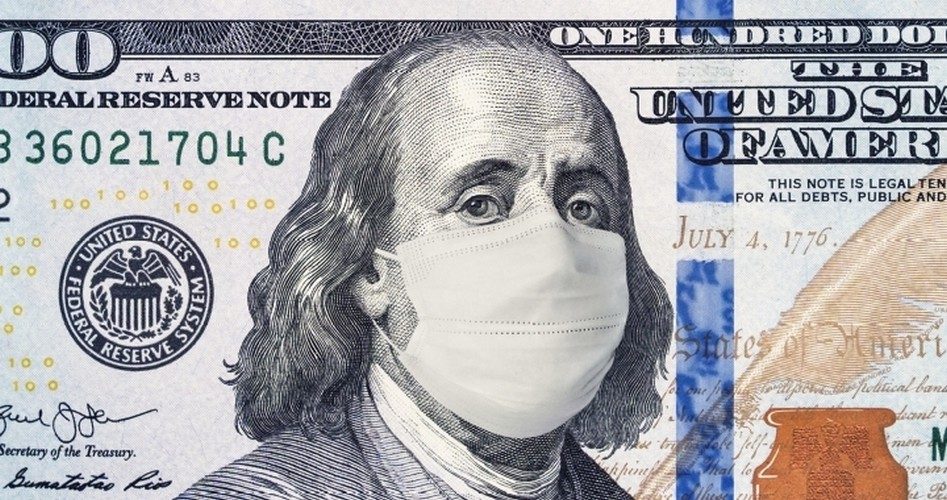
In response to the Chinese Communist Party coronavirus and subsequent lockdowns and shutdown of businesses as mandated by state governors across the country, lawmakers in the U.S. Senate have drafted a $1 trillion stimulus package — the largest in U.S. history.
Congress has already passed two bipartisan government-funded aid packages, both of which President Trump has signed: 1) the Coronavirus Preparedness and Response Supplemental Appropriations Act of 2020 (H.R. 6074), which provided $8.3 billion in emergency funding for federal agencies and first responders; and 2) the Families First Coronavirus Response Act (H.R. 6201), providing $104 billion for emergency paid leave, expanding unemployment insurance, and to cover the cost of coronavirus testing.
The current bill, known as the ‘‘Coronavirus Aid, Relief, and Economic Security Act’’ or the ‘‘CARES Act’’ (S. 3548), dwarfs the first two at about $1 trillion, which will include rebate checks for households that meet certain requirements.
During the March 17 Coronavirus Task Force press conference, Secretary of the Treasury Steven Mnuchin urged, “We’re looking at sending checks to Americans immediately and what we’ve heard from hard-working Americans, many companies have now shutdown, whether it’s bars or restaurants. Americans need cash now and the President wants to get cash now — and I mean now — in the next two weeks.”
According to a two-page Treasury Department document entitled “Stage Three Proposal,” the federal government plans to issue $500 billion in direct payments to individual taxpayers in two rounds:
• $250 billion, to be issued on April 6
• $250 billion, to be issued on May 18
These payments will be administered by the IRS and the Bureau of the Fiscal Service.
As of March 20, the bill drafted by Senate Republicans would provide direct payments up to $1,200 for individual taxpayers ($2,400 for married couples), and $500 for each child in a household. The rebate checks would start to phase out at $75,000 ($150,000 for married couples) in adjusted gross income based on 2018 tax returns.
The Senate bill includes establishing a $50 billion lending program for the airline industry, so long as they keep flying; $8 billion for cargo air carriers; an additional $150 billion for secured lending or loan guarantees to assist other severely distressed business sectors; and $300 billion in forgivable bridge loans for small businesses. The bill also reverses previous cuts to the Centers for Disease Control (CDC) and National Institutes of Health that President Trump proposed in his February budget proposal for next year.
On March 19, Senate Majority Leader Mitch McConnell (R-Ky.) told CNN about the bill: “The key to this clearly is to get past this, to bend the curve, as Dr. Fauci continues to tell us. And that requires this kind of isolation that shuts down the economy. So it’s our job to step in and help people through what we hope will be a short-term shutdown of our economy.” Dr. Anthony Fauci is the director of the National Institute of Allergy and Infectious Diseases.
Despite overwhelming support from both Republican and Democrat leadership, not all Senate Republicans are enthusiastic.
“Right now, the plan around here is basically to just to start shoveling money out of a helicopter — and the most important debate is whether or not Republicans or Democrats get to shovel the money first,” Senator Ben Sasse (R-Neb.) said. “This is a bad idea…. We don’t need a policy where Washington, D.C., handpicks winners and losers.”
In fact, none of these measures proposed by Senator McConnell, Secretary Mnuchin, the White House, and others on Capitol Hill are constitutional. Nowhere in the Constitution is Congress or the Executive Branch of the federal government granted extraordinary powers during times of an emergency to stop, subsidize, or take over large swaths of the economy.
The federal government is promoting government-funded socialism in order to alleviate the financial impact of government-mandated shutdowns of businesses. Though President Trump was elected to “drain the swamp” of Big Government, should he sign these measures into law, he would be condoning Big Government programs strongly resembling FDR’s “New Deal.”
If you would like to contact your federal legislators in the House of Representatives and Senate to urge them to oppose the $1 trillion so-called CARES Act (Senate bill 3548), click here to send a prewritten, editable e-mail, tweet, phone call, or video message.
Image: Diy13 via iStock / Getty Images Plus




